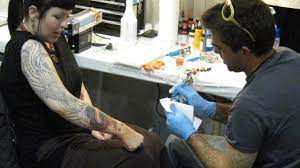
Tattoos are widely accepted across most of the world, but Japan stands out as an exception. Tattoos have long been associated with mafia culture, making public displays of visible body art taboo. Due to these restrictions, tattoo artists have had to operate undercover. However, a recent court ruling has altered how Japanese law views tattooed people. Yet, it will take time before Japan fully accepts all those with tattoos.
Tattoos as a Cultural Tradition and Their Association with Criminality
Tattoos have long been part of Japanese culture. Initially, Tattoos were used as punishment against criminals, with markings such as the Kanji for dogs being standard for thieves. Tattoos were also used as identification tools among members of the Yakuza crime gang. However, during Japan’s transition towards Western influence in the 19th century, there were concerns by the government that Tattoos might make its citizens seem barbaric compared to their Western peers.
Acceptance and Restrictions in Japanese Society
Although Japanese society generally accepts visible tattoos, public baths, and onsen may refuse admission depending on the location. To ensure a successful visit, it’s wise to research and contact these facilities beforehand. Travelers with large Tattoos should cover them whenever possible to prevent any confrontations from arising.
Tattoos as a Form of Art and Self-Expression
Tattoos have gradually become more accepted among Japanese youth. However, some businesses and public establishments still refuse entry to tattoo individuals due to historical anti-tattoo sentiment and its association with criminality and yakuza membership. Taiki Masuda, a tattoo artist, fought against this ban and successfully organized an NGO representing over 200 tattoo artists. He advocates for the right to practice tattooing.
Changing Perceptions and International Influence
Tattoos are not illegal in Japan, but society still views them with suspicion. People with Tattoos typically keep them covered for professional and social reasons. However, attitudes may change due to the upcoming Rugby World Cup and 2020 Olympic Games, bringing more international visitors who may help alter Japanese perceptions about tattoos. Bathing facilities are making efforts to increase the acceptance of tattooed foreigners.
Legalization and Steps Towards Acceptance
In 2001, a Health, Labour, and Welfare Ministry notice stated that tattooing should be treated as a medical practice due to needle piercing of the skin. This forced tattoo artists into hiding. However, this decision has been overturned by a local court, giving hope that tattoo artists can eventually work legally in Japan. Until then, foreigners with tattoos should cover up when visiting temples or shrines.
Tattoos and their Historical Associations with Crime
Tattoos have historically been frowned upon in Japan, which values conformity and shuns ‘primitive’ practices. They were long associated with crime gangs, particularly the Yakuza. Criminals would brand themselves with large tattoos as part of initiation ceremonies or to demonstrate wealth and strength within their organization. Tattoos also served as identifying marks for members, even in death.
The Changing Landscape
Tattoos remain relatively uncommon today, with many who possess them choosing to conceal them for professional and social reasons. People with tattoos should exercise caution when entering public baths, as some do not accept them. Nevertheless, with the upcoming international events and the shift in perception, Japan is slowly moving towards acceptance of tattooed foreigners.

